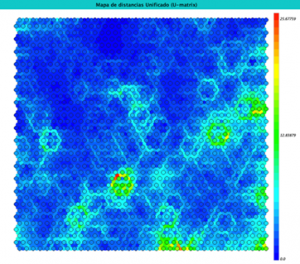Project SOM. Students’ activity patterns in online courses

Identification of activity patterns in subjects taken through eLearning
One of the main objectives of the project is the search for patterns of behaviour in a large sample of students who have taken courses online. Special care has been taken to extract, adapt and standardise the data, as well as to encrypt and anonymise it.
The cornerstone of SOM is to carry out an analysis of the activity generated over 4 years on an online teaching platform. Specifically, it will focus on students’ behaviour in the various activities carried out through the platform, such as their participation in forums, completion of tasks or attendance at online classes among many other analysis events that are taken into account, in order to characterise or identify students’ behaviour patterns in their learning.
From this information, correlations between behaviour patterns and various academic aspects such as grades and study habits can be established and analysed.

To achieve this objective, a methodology has been designed that uses a neural network trained to analyse data obtained from student behaviour in a virtual environment.
The aim of this study is to demonstrate that online education can have similar patterns to face-to-face education.
For more information:
Driscoll, A., Jicha, K., Hunt, A. N., Tichavsky, L., & Thompson, G. (2012). Can online courses deliver in-class results? A comparison of student performance and satisfaction in an online versus a face-to-face introductory sociology course. Teaching Sociology, 40(4), 312-331.
Euzent, P., Martin, T., Moskal, P., & Moskal, P. D. (2011). Assessing student performance and perceptions in lecture capture vs. face-to-face course delivery. Journal of Information Technology Education: Research, 10(1), 295-307.
Horspool, A., & Lange, C. (2012). Applying the scholarship of teaching and learning: student perceptions, behaviours and success online and face-to-face. Assessment & Evaluation in Higher Education, 37(1), 73-88.
Partners: Universidad Internacional La Rioja (UNIR), Universidad Complutense de Madrid y Universidad Politécnica de Madrid
Funding type: Own-Inter-university
